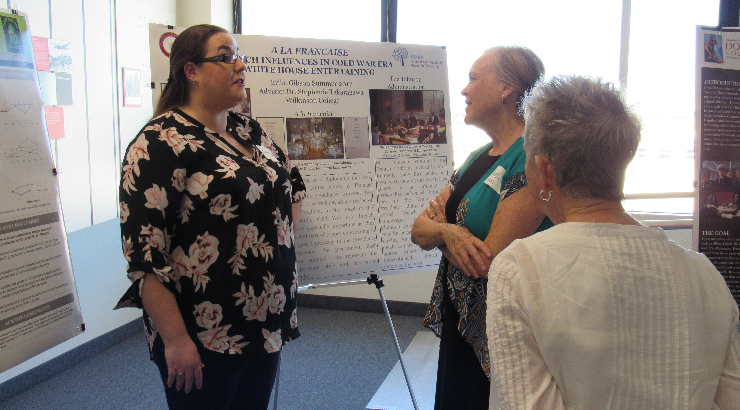
Petit Fours and Presidential Persuasion: Erika Gibson (’17) talks food and history in her published research, “Frenchified” Chapman University History alumna and masters student explores French food and the White House.
March 13, 2018
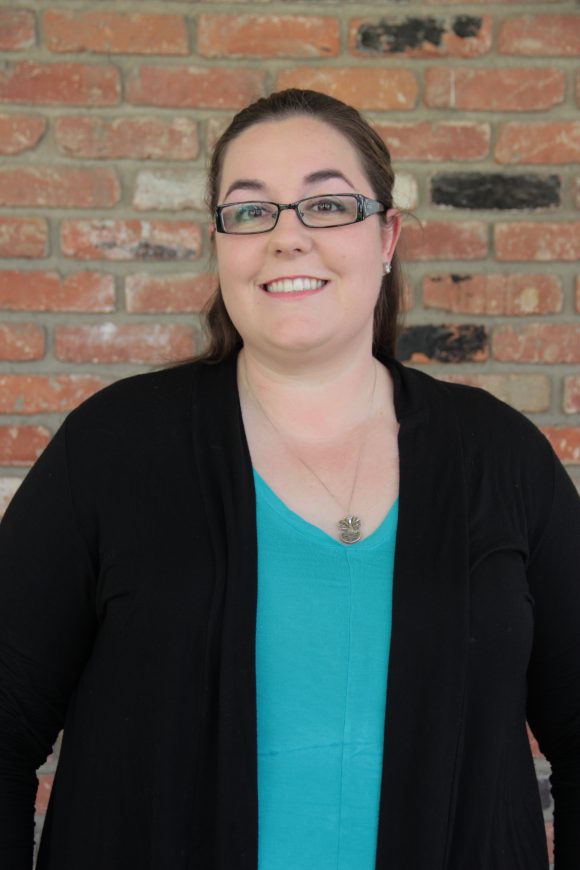 Erika Gibson (’17), graduate of Chapman’s History department, and now War and Society’s Masters student, can be described as a time-traveling, historical archaeologist of sorts. Her undergraduate research career is extensive and impressive, including a number of fellowships, research expeditions from Boston to Austin, and even conferences that have taken her as far as Rome, Italy. Most striking, however, is not Gibson’s resume, but the passion and genuine excitement she exudes when sharing her relationship with historical research.
Erika Gibson (’17), graduate of Chapman’s History department, and now War and Society’s Masters student, can be described as a time-traveling, historical archaeologist of sorts. Her undergraduate research career is extensive and impressive, including a number of fellowships, research expeditions from Boston to Austin, and even conferences that have taken her as far as Rome, Italy. Most striking, however, is not Gibson’s resume, but the passion and genuine excitement she exudes when sharing her relationship with historical research.
“I’ve been a history fanatic literally all my life…but my first memory of Jefferson was fifth grade.” Her father being a historian, Gibson grew up reading history books, but found her focus in the latter half of elementary school. Disappointed that Thomas Jefferson was an “off-limits” report topic due to his popularity, Gibson settled insightfully: “I remember thinking in fifth grade, ‘that’s okay, I’ll do Madison. He’s Jefferson’s protege.'”
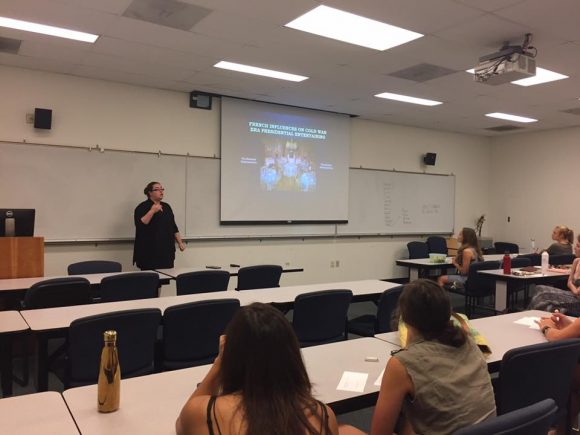
Over a decade later at Chapman University, history seemed to repeat itself for Gibson when it came time to choose a topic for her senior thesis research project: “I remember Dr. [Alexander] Bay saying, ‘There’s no way you can do Jefferson, he’s totally done.’ And it was one of those ‘hold my beer, I’ll find this’ moments.” With fiery determination, Gibson describes storming the library, pulling every book on Jefferson off the shelf, and sitting on the floor combing through every page, looking for holes in the literature on her historical idol. She found that hole, and “the hole was dining.” Though the literature mentioned Jefferson’s passion for French cooking, it was often reduced to an insignificant hobby. Gibson, believing no choice is accidental, had a hunch that Jefferson’s use of French cuisine in the White House had everything to do with diplomacy, “shaping a nation and a political identity.”
Having transferred to Chapman University as a second semester junior, Gibson was pleasantly surprised by the emphasis on research within the History Department, admitting that she “had been to a four year university before and had never had this kind of research focus.” But her spirited interest in Thomas Jefferson was a springboard giving way to securing a month-long fellowship at Thomas Jefferson’s Monticello and a Travel Grant through the Center of Undergraduate Excellence to pursue this opportunity. There she was able to more thoroughly investigate her senior thesis topic, exploring Jefferson’s use of French cuisine, who it was served to, and how it influenced guests. Her thesis ultimately concludes, “that it was a calculated part of his diplomatic presidency style…it set the precedent for later dining.”
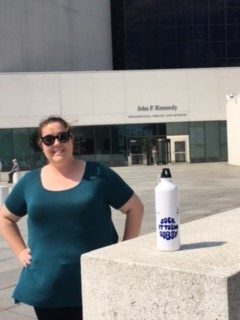 Under the mentorship of Dr. Stephanie Takaragawa, Gibson delved into the use of French dining in later presidencies of the Cold War Era, particularly looking at John F. Kennedy and Lyndon B. Johnson. Accepted as a 2017 SURF fellow, Gibson used her 8-weeks devoted to research visiting the JFK Library in Boston and the LJB Library in Austin. She combed through archives and files, looking for common threads and implications of the use of French cuisine across presidencies. With a smile, Gibson shares, “I looked at a lot of notes from Jackie O. because she was very involved, which was very very cool…I wound up opening a file and there were sketches of Jackie O.’s dresses by her designer for these different events.”
Under the mentorship of Dr. Stephanie Takaragawa, Gibson delved into the use of French dining in later presidencies of the Cold War Era, particularly looking at John F. Kennedy and Lyndon B. Johnson. Accepted as a 2017 SURF fellow, Gibson used her 8-weeks devoted to research visiting the JFK Library in Boston and the LJB Library in Austin. She combed through archives and files, looking for common threads and implications of the use of French cuisine across presidencies. With a smile, Gibson shares, “I looked at a lot of notes from Jackie O. because she was very involved, which was very very cool…I wound up opening a file and there were sketches of Jackie O.’s dresses by her designer for these different events.”
Unlike most research in the modern age, historical research of this kind requires hours of in-person investigating, flipping through pages and scrounging through boxes. But for Gibson, this was no chore: “I love old books and papers, so that helps.” All presidential libraries belong to the national archive system, meaning they are open to the public. You simply make an appointment. Luckily for Gibson, both the LBJ and JFK Libraries proved to be extremely cooperative and helpful. At the LBJ Library, Gibson describes, “I got there and they pre-researched my research!” She recalls her experience with residual excitement and appreciation, “[The librarians] said, ‘well Erika we found the complete scrapbooks from Lady Bird, so we’re going to go ahead and pull them and have them brought out to you.’ I got thirteen boxes of Lady Bird Johnson’s scrapbooks.” The boxes contained countless programs from each White House event with menus and a complete guest list. “It’s all very physical, and you never know when you’re flipping through these pages what you’re going to find.”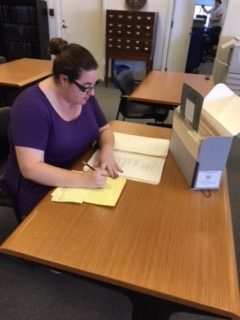
Gibson entitled her research project Frenchified, a nod to the infamous Aaron Burr insult that Jefferson was “too frenchified.” From the outset, her goals for the project were well-defined: she wanted to write a strong thesis, publish that thesis, and present her work at a conference. With focus, dedication, countless hours of work, and invaluable faculty guidance, Gibson has accomplished all three goals. This past fall, Gibson was invited to present at the Seventh Annual International Food Studies Conference in Rome, Italy, where she spoke about her thesis published in the conference’s affiliated journal, The International Food Studies Journal. Of her research journey, Gibson confirms, “The most rewarding has been setting a goal and achieving it. That said, it’s also been the most difficult thing.”
Having achieved so much as an undergraduate, what’s next for Erika Gibson? She says, “Theoretically, I’m pre-law. And pre-law is all research and writing. I really want to study constitutional law, and a lot of that is rooted in the history I studied with Jefferson.” For the time being however, she notes there is still more to explore at the masters level in Chapman University’s War and Society graduate program. She hopes to continue her scholarly inquiry there, focusing on the relevant concept of soft power, explained as, “winning the hearts and minds of other nations.” Gibson finds that Jefferson, JFK, and LBJ used French food as a form of soft power and cultural exchange that sends a political message. Though the current presidency does not execute soft power using French cuisine, culture is still used strategically in international relations and “looking at those cultural exchanges through a political perspective is really, really important.”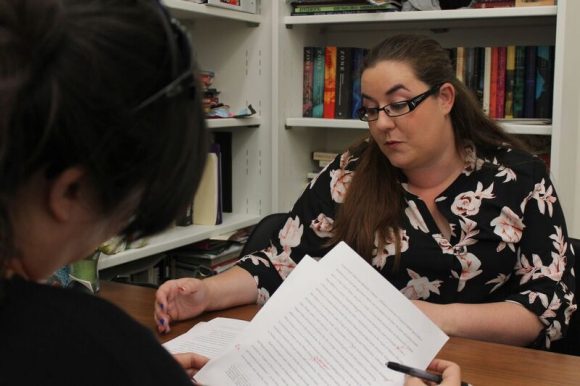
Reflecting on her research experiences, Gibson offers current undergraduate researchers and creative scholars this constructive piece of advice: get to know your faculty, and be friendly with professors. “They know what you don’t know, not just in the department and not just in your field, but the research process and how to find conferences and how to find research.”
Erika Gibson’s experience is a prime example of the multitude of places research can take you, even at the undergraduate level! If you want to get involved in the undergraduate research scene here at Chapman University, Center for Undergraduate Excellence is here to help you get started.
Feel free to reach out directly to one of our experienced Student Scholar Ambassadors for questions or advice on how to jump start your career in research or creative activity.
Follow and like Center for Undergraduate Excellence on Facebook to learn about all the events and opportunities happening on campus every day!